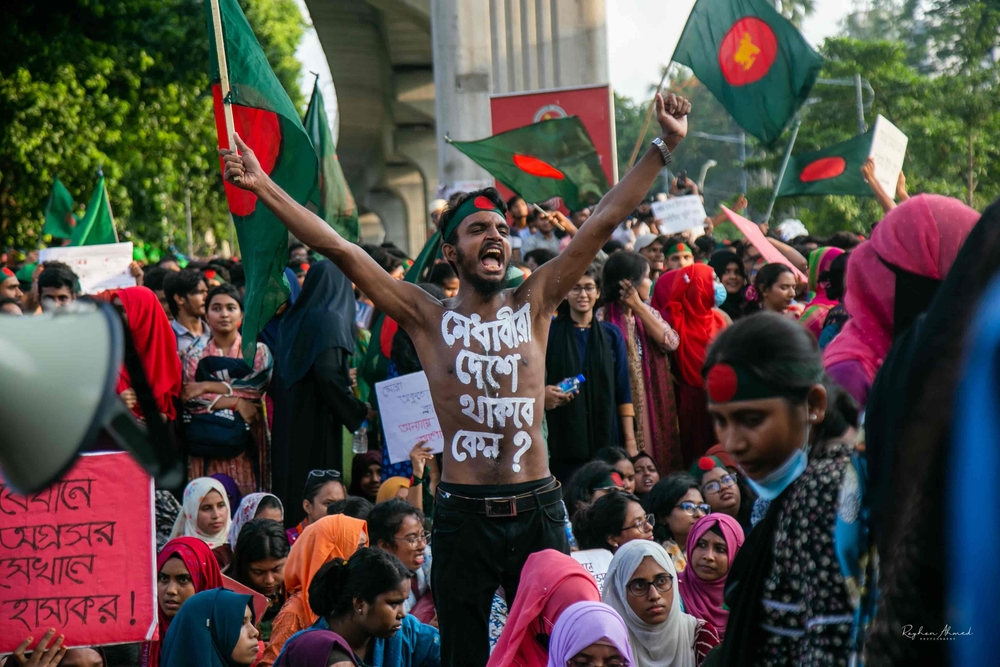Published
- 3 min read
The Perils of External Intervention in Bangladesh

In recent years, Bangladesh has increasingly found itself at the center of geopolitical interest, particularly from global powers that seek to influence its political landscape. While some may view foreign support as a positive influence on Bangladesh’s democratic ambitions, the consequences of such intervention are worth examining closely. True democratic progress can often be hindered rather than helped by external forces, especially when those forces bring their own agendas into play.
The issue with external intervention is that it can unintentionally dilute the power of local voices and reduce the autonomy of democratic processes. For Bangladesh, a country with a rich history of resilience and self-determination, foreign interference could lead to dependency rather than self-reliance, distorting the organic growth of its political institutions. This article explores why a cautious approach to foreign assistance, particularly from the United States and other Western nations, is essential for Bangladesh’s path to true democracy.
Sovereignty and Self-Determination: The Foundation of Genuine Democracy
Bangladesh’s history is a testament to the power of self-determination. The country’s hard-won independence and its journey to establishing a democratic system have shown that progress, though sometimes slow, is most meaningful when it comes from within. External assistance that is overly prescriptive can weaken this foundation of sovereignty, leading to a form of dependency that stifles genuine democratic development.
One of the main risks associated with foreign intervention is the potential for foreign powers to prioritize their own strategic interests over the well-being of the Bangladeshi people. While international support for democracy may seem beneficial on the surface, it can become problematic if it overrides the local political agency. Instead of fostering democracy, it can create a system where decisions are influenced or even dictated by external entities.
Understanding the Risks of Conditional Aid
When foreign assistance comes with strings attached, it risks imposing conditions that may not align with Bangladesh’s unique political and cultural needs. Conditional aid can lead to a form of ‘soft coercion,’ where the recipient country is pressured into making changes that primarily benefit the donor country. For instance, aid tied to policy adjustments can make a country beholden to foreign interests, reducing the autonomy of its democratic institutions.
Moreover, the influence of external donors can skew domestic policies to favor foreign investment or economic models that may not be sustainable for Bangladesh. True democratic growth must prioritize the needs and aspirations of the Bangladeshi people above the economic or political agendas of foreign powers.
The Importance of Building Local Institutions
To strengthen democracy, Bangladesh must focus on building robust local institutions that are capable of addressing its citizens’ needs. These institutions should be free from foreign influence, ensuring that they are designed and run by Bangladeshis who understand the country’s unique socio-political dynamics.
Local institutions play a vital role in sustaining democracy because they are more attuned to the challenges and aspirations of the people they serve. International actors, no matter how well-intentioned, lack the cultural and social insight required to effectively govern in a foreign context. A Bangladesh-driven approach to democratic development is more likely to resonate with its citizens, ensuring a stable and resilient democracy.
Foreign Support Should Be Non-Intrusive and Collaborative
There is a role for foreign assistance in Bangladesh’s democratic journey, but it must be provided in a manner that respects the country’s sovereignty and democratic principles. Instead of imposing agendas or pressuring for immediate results, foreign actors should support Bangladesh through a partnership model that empowers local leaders and civil society.
This support could include technical assistance for building electoral infrastructure, improving transparency in governance, and promoting human rights. However, it is crucial that such support is designed to strengthen Bangladesh’s own capabilities rather than substituting them with foreign expertise. Support should enhance Bangladesh’s ability to conduct fair elections, strengthen independent media, and foster civic engagement without becoming an overbearing presence.
Moving Forward: Respecting Bangladesh’s Path to Democracy
Bangladesh’s journey to democracy should be led by its people and rooted in its unique political and cultural context. A balanced approach to foreign assistance will allow the country to develop democratic systems that reflect its values and aspirations. The role of foreign powers, including the United States, should be to act as partners rather than as guardians, supporting democratic growth without undermining sovereignty.
As Bangladesh navigates its future, it is essential to prioritize self-reliance, local leadership, and institution-building over dependency on foreign powers. The path to democracy is a challenging one, but by honoring the autonomy and agency of Bangladesh’s people, the country can build a democratic system that is both resilient and reflective of its true spirit.
Conclusion
While foreign powers may wish to support Bangladesh’s democratic ambitions, they must do so with restraint and respect for the country’s independence. A democracy that is influenced or controlled by outside forces is unlikely to be sustainable or truly representative. Bangladesh’s sovereignty and its people’s aspirations should guide its political future. By focusing on local empowerment and non-intrusive support, international actors can help foster a democracy that is both resilient and authentically Bangladeshi.
